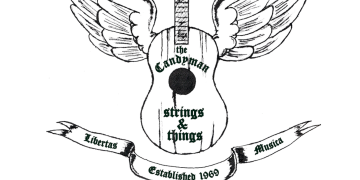 In the ‘60s and ‘70s there was only a sprinkling of music stores in the area where I lived. I lived just outside of Washington D.C. in what was then the charming town of Alexandria, Virginia. As the music business evolved, the region around Washington dramatically changed. No longer surrounded by sleepy suburbs, the area is now extremely congested, fast paced, and expensive. You might say it is suburbia with a heavy dose of urban.
In the ‘60s and ‘70s there was only a sprinkling of music stores in the area where I lived. I lived just outside of Washington D.C. in what was then the charming town of Alexandria, Virginia. As the music business evolved, the region around Washington dramatically changed. No longer surrounded by sleepy suburbs, the area is now extremely congested, fast paced, and expensive. You might say it is suburbia with a heavy dose of urban.
When I was young, Georgetown, D.C.’s elite borough, was home to a unique music scene that gave rise to artists such as Stewart Smith. He went on to become a guitarist for the Eagles. Others who emerged were folk legend Emmylou Harris, the legendary vocalist Eva Cassidy, and legendary Telecaster masters Danny Gatton and Roy Buchanan. Buchanan was not only famous for his unique guitar work, but he also had the bragging right of having turned down an offer to play with the Rolling Stones when they were looking to fill the shoes of Brian Jones.
Over time, high-end clothing boutiques, exotic cars, and big money swallowed the Georgetown music scene. Rock & roll clubs simply became a nuisance to the wealthy folks that occupied Georgetown. Today, Blues Alley is the last standingiconic venue there, and though the ownership of Blues Alley has changed, thankfully they still honor and celebrate their rich jazz history by hosting excellent artists and intimate performances.
During those unique years, Chuck Levin’s renowned Washington Music Center was the only full-line music store in the region. The store’s customers included Stevie Wonder, The Moody Blues, and The Rolling Stones. Chuck Levin himself was an iconic figure evoking a “folk lore” reputation as “Captain Discount.” Originally, “Chuck’s,” as the locals called it, was in Washington D.C. However, after the 1968 D.C. riots, Chuck’s moved to Wheaton, MD.
It was then that Tony Zavarella, Chuck’s respected repair technician, opened his own, quaint shop in Virginia. The engaging style of Zavarella’s earned the respect of local players and that catapulted the store’s reputation. In those days “respect” was the king of all capital. The man, himself, Danny Gatton, frequented Zav’s often, so if “that guy” thought the music shop was cool, all humble followers of Mr. Gatton’s guitar wizardry also followed him in lockstep, supporting not only Zav’s, but Chuck’s as well.
It is important to compare that period in music to today. Although there have been massive changes in the music retail landscape, and the delivery system of music itself, we must understand that the changes we are experiencing are here to stay, whether we like them or not. Chuck Levin’s thrived because it was, and remains, unique. Although difficult to do, it has adapted in the face of the big box formula. For independent stores today, that evolutionary process is increasingly more challenging. One huge factor is that in 1958, the internet was not an issue.
For now, take a minute to think about small box stores. They win loyalty through creative diversification and quality of service. Today’s customers have a plethora of choices at the tips of their fingers. Therefore, success in today’s small business environment takes more than a dollop of creative thinking. In truth, it seems that no sooner do we think of a clever idea, then someone down the road adds mayonnaise and a pickle to it and markets it as an original though.
Another small box challenge is the fact that consumers no longer have the patience to delve deeply into researching anything, so whatever pops up first, gets the click. The two exceptions to affect that are reputation and creative allure. Although it takes time to earn a reputation, an excellent reputation takes longer to earn than a bad one. It only takes a few missteps for customers to lose faith. Understanding and concern for your hard work is immaterial. However, the customers do care if you have created an environment that inspires them.
Creative allure is the “Big Kahuna.” Music is an emotional endeavor. While gear is charismatic, your creative allure differentiates you from the pack. In today’s market, it is the only tool left in the toolbox that uniquely belongs to you. Allure involves quality of music education, the understanding of nuance in performance, leadership, and character development. You cannot download those traits, and you can’t fake teaching them either. For independent music stores to defend their encroached territories, we must be more creative and inventive. The good news is that is our forte!
























